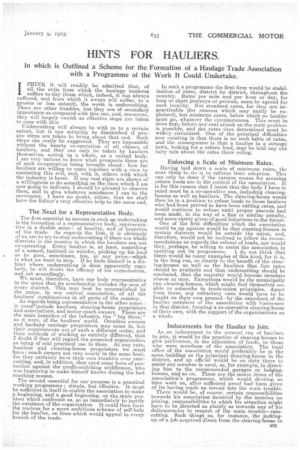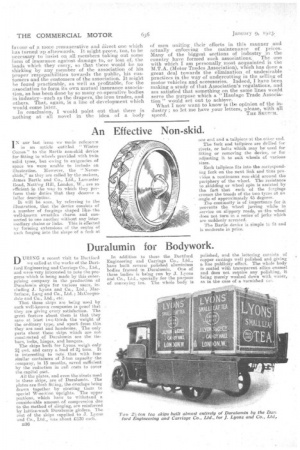HINTS FOR HAULIERS.
Page 21

Page 22

If you've noticed an error in this article please click here to report it so we can fix it.
In which is Outlined a Scheme for the Formation of a Haulage Trade Association with a Programme of the Work It Could. Undertake.
ITHINK it will readily be admitted that, of all the evils from, which the haulage business suffers to-day (from -which, indeed, it has always suffered, 'and from which it aways will suffer, to a greater or less extent), the worst is undercutting. There are other troubles, but they are of secondary importance as compared with this one, and, moreover, they will largely vanish as effective steps are taken to cope with this.
Undercutting will always be with us to a certain extent, but it can certainly be diminished if proper steps are taken to bring about that end. Such steps can easily be suggested. They are impossible without the hearty co-operation of all classes of hauliers, and they can only be taken by hauliers themselves, acting as a whole, as a united body. I amevery curious to know what prospects there are of such co-operation being brought about : how far hauliers are willing to come together with a view to combating tins evil, and, with it, others with which the industry is beset. If any veal signs are shown of a willingness to do something on the lines which I am now going to indicate, I should be pleased to observe them, and to give whatever assistance I can to the movement. I have no doubt, either, that we shall have the Editor's very effective help to the same end.
The Need for a Representative Body.
The first essential to success in such an undertaking is the formation of a representative body, representative in a doufble sense : of locality, and of branches of the trade. As regards the first, it is obviously of no use to try to stop undercutting if there are whole districts in the country in which the hauliers are not co-operating. Every haulier. is, at least, something of a nomad, inclined to wander, picking up his load . as he goes, sometimes, too, at any price—which is what we want to stop. If he finds himself in a district where undercutting is done apparently regularly, he will doubt the efficacy of his organization, and act accordingly. We must, therefore, have our body representative in the sense that its membership includes the men of every district. This may best be accomplished by the union, in one central association, of all the hauliers' combinations in all parts of the country. As regards being representative in the other sense : it must" include h.aidiers, clearing-house proprietors and associations, and motor coach owners. These are the main branches of the industry, the "big three," as it were, of the hauliers' world. Omnibus owners and hackney carriage proprietors may come in, but their requirements are of such a different order, and their methods of working so entirely different, that I doubt if they will regard the proposed organization as being of real practical use to them. At any rate, hauliers and clearing-house proprietors we must have : coach owners are very nearly in the same boat, for they certainly have their own troubles over ratecutting, and, in addition, they need some form of protection against the nrofit-snatching middleman who was 'beginning to male himself known during the last coaching season. .
The second essential for our purpose is a practical working programme ; simple, but effective. It must be sufficient in itself to enable the association to make a beginning, and a good beginning, on the main problem which confronts us, so as immediately to justify the existence of the organization. It could then form the nucleus for a more ambitious scheme of self-help for the 'haulier, on lines which would appeal to every branch of the trade. In such a programme the first item would be stabilization of rates, district by district, throughout the country. Rates per mile and per hour or day, for long or short journeys or periods, must be agreed for each locality. Not standard rates, for they are impracticable (for reasons which may easily be explained), but minimum rates, below which no haulier must go, whatever the circumstances. This must be done first, before any real attack on the main problem is possible, and the rates thus determined must be widely circulated. One of the principal difficulties now existing is that there is no such table of rates, and the consequence is that a haulier in a strange town, looking for a return load, may be told any old fairy tale about the rates there ruling.
Enforcing a Scale of Minimum Rates.
Having laid down a scale of minimum rates, the next thing to do is to enforce their adoption. This can only be done if the various means for securing return loads are in the control of the association. It is for this reason that I insist that the body I have in mind must be a co-operative one, including clearinghouses as well as hauliers. The clearing-house would then be in a position to refuse loads to those hauliers who had been proved to have been cutting rates, and would continue to refuse until proper amends had been made, in the way of a fine or similar penalty,. and some surety given of good behaviour in the future. One of the first, difficulties which the association would be up against would be that clearing-houses in certain districts would •be outside the union, and, therefore, would not be inclined to follow its recommendations as regards the refusal of loads, nor would they, perhaps, be willing to assist the association in carrying out its programme. I do not think that there would be many examples of this -kind, for it is, in the long run, so clearly to the benefit of the clearing-houses as well as the hauliers that fair rates should be available and that undercutting should be combated, that the majority would become members almost at once. Exceptions would be the municipally run clearing-houses which might find themselves unable to subscribe io trade-union principles. Apart from these, any refractory ones would have to be fought on their own ground—by the expedient of the haulier members of the association with businesses in that district, forming a co-operative clearinghouse of their own, with the support of the organizations as a whole.
Inducements for the Haulier to Join.
As an inducement to the general run of hauliers to join, it would be the practice of clearing-houses to give preference, in the allocation of loads, to those who were members of the association. The local office of the association would preferably be in the same building as the principal clearing-house in the district, and an official would be on duty .there to assist any member in need, as for example, in directing him to the recommended garages or, lodginghouses, and so on. These are the minor items of the association's programme, which would develop as time went on, after sufficient proof had been given of its having made an inroad into the main trouble.
There would be, of course, .certain responsibilities towards his association incurred by the member on joining, responsibilities to which his attention might have to be directed as plainly as towards any of his delinquencies in respect of the main trouble—ratecutting. Such things as, for instance, the jackingup of a job acquired direct from the clearing-house in
favour of a 11.1010 remunerative and direct one which has turned up afterwards. It might prove, too, to be necessary to insist on all members taking out some form of insurance against damage to, or loss of, the loads which they carry, so that there would be no shirking by any member of the association of his proper responsibilities towards the public, his customers and the customers of the asSociation, it might he found practicable, as well as profitable, for the association to form its own mutual insurance association, as has been done by so many co-operative bodies in industry—such as the dra,pers, the iron trades, and others. That, again, is a line of development which would come later Inconclusion, I would point out that there is nothing at all novel in the idea of a body
of men uniting their efforts in this manner and actually enforcing the maintenance of pikes. Many of the biggest sections of industry in the country have formed such associations. The one with which I am personally most acquainted is the M.T.A. (Motor Trades Association), which has done a great deal towards the elimination of undesirable practices in the way of undercutting in the selling of motor vehicles and accessories. Indeed, I have been making a study of that Association's regulations, and am satisfied that something on the same lines would serve the purpose which a "Haulage Trade Association " would set out. to achieve.
What I now want to know is tisa opinion of the industry; so let me have your letters, please, with all speed. THE SKOTeli: '
































